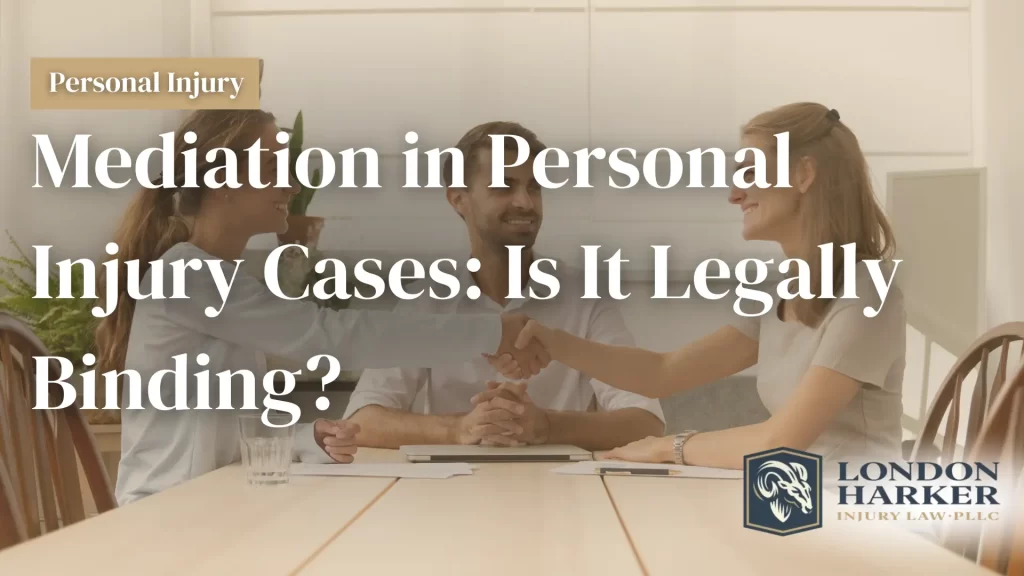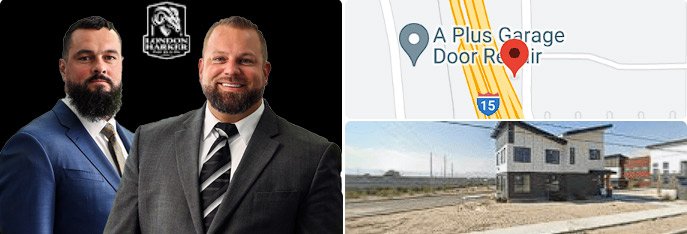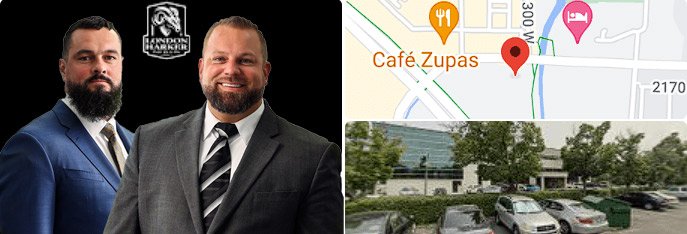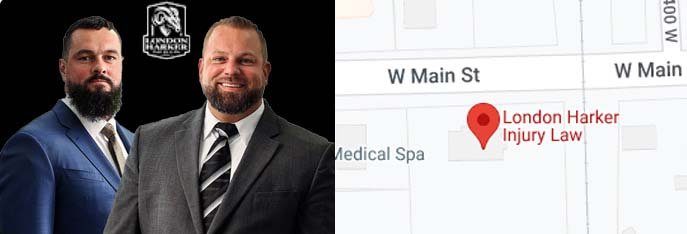Posted on Friday, March 1st, 2024 at 9:00 am

Mediation offers a way to resolve personal injury cases without going to trial. When you are injured because of the negligence or wrongdoing of another person, you may wonder about your options for seeking compensation. Mediation provides an alternative to traditional court proceedings, but you might question whether mediation agreements hold legal weight. In this post, London Harker Injury Law explores the role of mediation in personal injury cases and discusses the legal implications of mediation agreements. It also answers why can mediation be legally binding in a personal injury case instead of relying upon court-ordered decisions.
What Does Mediation Mean in a Lawsuit?
Mediation is a form of alternative dispute resolution (ADR) process that involves a neutral third party who facilitates negotiations between the parties involved in a lawsuit. In a personal injury case, mediation typically involves the injured party (plaintiff), the at-fault or opposing party (defendant), and their respective attorneys. They also include all of the insurance companies involved from both parties.
The mediator aims to help both sides reach a mutually acceptable agreement without going to trial as it can be time-consuming. If you are involved in a legal case or a civil lawsuit, law firms can charge high attorney’s fees that can be expensive.
During a mediation session, the mediator meets with both parties, either together or separately, to discuss the case and explore potential settlement options. The mediator does not make decisions or force either party to accept a particular outcome. Instead, they encourage open communication, identify common ground, and guide the parties toward a resolution that accounts for all of the pain and suffering experienced.
Can You Back Out of a Mediation Agreement?
Is mediation legally binding in a personal injury case? Yes, once both parties reach an agreement and the settlement terms are put in writing and signed, the mediation becomes a legally binding contract. Both parties must adhere to the terms outlined in the agreement, and failure to do so can result in legal consequences.
However, there are some limited circumstances under which a party may be able to back out of a mediation agreement:
- Fraud or misrepresentation: If one party can prove that the other party misrepresented facts or engaged in fraudulent behavior during the mediation process, the agreement may be invalidated.
- Duress or coercion: If a party can demonstrate that they were forced or coerced into signing the agreement under duress, the agreement may be void.
- Unconscionability: If the terms of the agreement are grossly unfair or one-sided, a court may determine that the agreement is unconscionable and unenforceable.
It’s important to note that these situations are rare, and proving fraud, coercion, or unconscionability can be challenging. Both parties are legally obligated to follow through with the terms once a mediation agreement is signed.
The Role of Offers and Demands in Mediation
During mediation, the defendant may present settlement offers and the petitioner may present counter-demands as a way to resolve the case. A settlement offer or demand outlines the terms under which the party is willing to settle the case. Settlement offers can include financial compensation and other non-monetary terms, such as a confidentiality clause.
The mediator’s role is to assist the parties in conveying and facilitating discussions on their offers and demands. The mediator may also provide insights into the strengths and weaknesses of each party’s case. This helps the defendants understand the benefits and risks of accepting or rejecting a settlement offer.
Accepting a settlement offer during mediation means agreeing to resolve the case based on the terms outlined. Once accepted, written, and signed, the settlement becomes final — making the mediation legally binding in a personal injury case. Can you change an agreement after mediation? No, once the plaintiff notifies the court with an “ADR Dispositional Notice” form, the case is officially concluded.
How Trial Lawyers and Opening Statements Fit into the Mediation Process
While mediation aims to resolve cases without going to trial, trial lawyers still play a critical role before mediation begins. Trial lawyers work with their clients to gather evidence, build a strong case, and develop a negotiation strategy. This preparation helps clients enter mediation with a clear understanding of their legal rights and the strength of their position.
The first step in mediation is that each side presents opening statements that outline their theories of the case. This can be made by the plaintiff, the defendant, or their respective lawyers. Opening words can specify how the speaker believes the accident occurred and who was at fault. It can also talk about what evidence will be used and how much money should resolve the case.
You may feel more secure if you allow your lawyer to present your opening statement. Personal injury lawyers are fully experienced in this kind of presentation and can handle it on your behalf.
The Mediator’s Role in Reaching an Agreement
 Mediators are trained professionals who understand the legal system and have experience facilitating negotiations. The mediator is crucial in guiding parties toward a resolution during mediation. They use various techniques to encourage open communication, identify common ground, and help parties find mutually acceptable solutions.
Mediators are trained professionals who understand the legal system and have experience facilitating negotiations. The mediator is crucial in guiding parties toward a resolution during mediation. They use various techniques to encourage open communication, identify common ground, and help parties find mutually acceptable solutions.
Some of the ways mediators work to help parties reach an agreement include:
- Encouraging active listening and promoting understanding between parties
- Speaking with each of the parties individually
- Identifying and clarifying misunderstandings or miscommunications
- Exploring the underlying interests and needs of each party
- Generating potential settlement options and encouraging creative problem-solving
- Reality-testing proposed solutions and discussing potential outcomes
- Maintaining a neutral and impartial stance throughout the process
Though mediators cannot force parties to reach a mediated settlement agreement, their guidance and expertise are invaluable.
Other Types of Alternative Dispute Resolution Process
In addition to mediation, other methods of resolution processes may be appropriate for personal injury cases:
- Arbitration: In binding arbitration, a neutral third party hears evidence from both sides and makes a binding decision. In non-binding arbitration, the parties have the option to reject the arbitrator’s decision. Arbitration can be voluntary or mandatory, depending on the case.
- Negotiation: Negotiation involves the parties and their attorneys working directly with one another to reach a settlement agreement without involving a neutral third party.
- Trial: In some cases, the parties cannot come to a meeting of the minds. When that happens, the remaining option is to take the case to trial. Based on the rules of evidence, a judge can make a final determination.
Contact London Harker Injury Law for Help
To learn more about how we can help with your personal injury case, contact the Utah personal injury lawyers of London Harker Injury Law today at 77CARCRASH for a free consultation. To answer your questions, discuss your legal options, save time, and support you every step of the way before case is settled, our talented team of personal injury lawyers can assure you a successful mediation.



